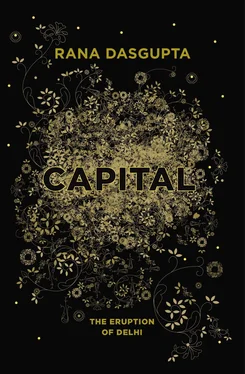• • •
For the greater part of the world’s population, the twentieth century was a period of immiseration and lost direction, and it supplies rather few sources of strength or inspiration for their condition today. The reason many of them have seized hold of the twenty-first century with such staggering energy is precisely because they are projected into it with ballistic force by their woeful experience of the twentieth, which, unlike in Europe and America, produces rather little nostalgia. Global capitalism is today stormed by warriors from many places, people for whom the past is cut off and who must therefore, in order to find a home, conquer the future.
The story we have told in this book, in which a place of dazzling wealth and cultural sophistication was taken over by a colonial power, in which that wealth and culture were shaken up and overturned, where a titanic power struggle led to a genocidal catastrophe, and where a post-colonial government undertook a massive project of economic engineering that ultimately exhausted itself and gave way to an energetic free-market backlash — this is, with some variations, the recent history of very much of the world. Of today’s two hundred-odd independent nations, roughly one hundred and forty came into being after 1900; most emanated after the Second World War from Western European empires — as India did — or, after 1989, from the agglomeration of the Soviet Union — and most would find something of their own history in these pages. Mine is a local story, but it is also the story of the global majority. It is not extraordinary. It is the normal story of our age.
Until recently, the fully fledged market society continued to exist mainly in those regions — America and Western Europe — that had played the greatest role in inventing modern capitalism in the first place, and over the centuries these regions had been able to come to some sort of truce between society and their volatile progeny. They had overcome their moral repugnance towards its promotion of materialism and greed, and they had developed a philosophical infrastructure which brought to the market society some sense of right and meaningful existence. They had built extra-market social mechanisms to mitigate some of its more terrible human ravages, and they had set up limits to the market’s dominion — to ensure the well-being of the poor and sick, for instance, or to maintain the integrity of leisure time and culture. Though they all went through enormous social violence and suffering as the waves of capitalist development passed through their peoples — Victor Hugo and Charles Dickens provide enduring parables of these trials — these societies continued to ‘own’ capitalism, to believe in its benign potential, and to feel that it could always be turned to new and better ends.
The billions who were abruptly ushered into global capitalism towards the end of the twentieth century had never reached this historical accommodation with it. Most of them, in fact, had spent the better part of the twentieth century being told that global capitalism was the source of all evil and that they should never succumb to it. It was not their system to shape or direct: it was built by foreigners who were traditionally thought of as heartless, spiritless imperialists — and they had a completely different sense of what it was, how it should be used and what it could do for them. They entered it, often, with enormous exhilaration and fervour, certainly, but also with great anxieties: that it would bring only unhappiness, that it would destroy too much, that it would make them resemble those Westerners whose greed and lack of values used to be such an important moral reassurance. The fact that, in the face of capitalism, they chose both to give and to deny themselves more totally than Westerners, the fact that they came to it with very different religious and philosophical histories, made it impossible to read their future out of the Western past. It was clear that they would find very different ways of accommodating capitalism into their social fabric, and that in so doing they would change the nature of the capitalist system itself.
In addition to all this, many of these places brought to the global table the legacy of immense historical traumas which had not been much processed in their societies. Since many of these traumas had had a profound effect on economic identities — on trust and suspicion with regard to strangers and contracts, on notions of wealth and poverty, private and common property — there was every reason to believe that this legacy would flood out into the functioning of the global system. We have become used to accepting the global force of the Jewish holocaust, which began to shape world politics, economy and culture from the moment it happened; but many of these other events, such as the partition of India, were ‘global’ events too, even if for a long time their effects were mostly confined to the place where they happened, and their inner contours remained obscure to the rest of the world. There was not only India’s Partition: there were also the mass famines of Stalin’s Soviet Union; Mao’s Cultural Revolution; the destruction of rural life in Brazil under the military dictatorship, and the accompanying shock urbanisation. Who could tell what residue remained of the 1950s famine that killed tens of millions of Chinese under Mao’s Great Leap Forward? — for even its most basic facts were still so unclear that it was impossible to tell how it might shape those survivors and their descendants who were now engaging with capitalism’s very different economy of scarcity and abundance. As these old events detonated belatedly into global space they would become part of universal history. Like the holocaust they would be taught in schools everywhere as ‘our’ history. The entire world would inherit their shock.
The dramatic expansion of the reach of global capitalism would change it profoundly. It was clear that things would get a lot wilder. Many new centres entered global capitalism ready to wage not peace but war. Many of them had had their faith in the idea of ‘society’ badly damaged, and, at a time when many of the world’s most pressing problems required the action of a collective global society, it was uncertain what role these warriors would play. It was clear that the creation of this ‘global society’ would require enormous empathy between world peoples and cultures. Only so could the vast bulk of newcomers feel any sense of investment in the system itself, or any faith that it was anything but a winner-take-all racket, in which the only reasonable objective was to belong to the small class of exploiters rather than the much larger mass of the exploited.
But it was clear also that the system’s experiential and philosophical base would be greatly broadened with the advent of these new members, who had not lost their sense of capitalism’s strangeness. It was certain that that this alone would produce radical new insights and visions. It was possible indeed that it might lead to an epochal efflorescence of world civilisation — the creativity and sophistication of which were the preconditions, anyway, for the system to realise its utopian, and not its apocalyptic, potential.
• • •
There is one last spot that Anupam wants to show me on the river. We have walked on, upstream from the dam at Wazirabad, and we have lost sight of the water. Anupam asks people how to get to the spot he is looking for; everyone gives contradictory directions. It is bizarre just how difficult it is to find this great river.
“I have not been here for twenty years,” he says, “and everything has changed. None of this was built last time I was here.”
We start walking down a busy road that is supposed to lead where he wants to go. The potholed road is being re-laid. A water truck pours water into a cement mixer; like all water trucks it is also leaking from every corner, so that the road is flooded. We get to the end of the road and climb over a wall. A boy is burning a foam mattress in order to retrieve the steel from the springs inside; the foam burns with a fierce flame which fills the place with toxic black smoke. Anupam covers his mouth with his handkerchief.
Читать дальше











